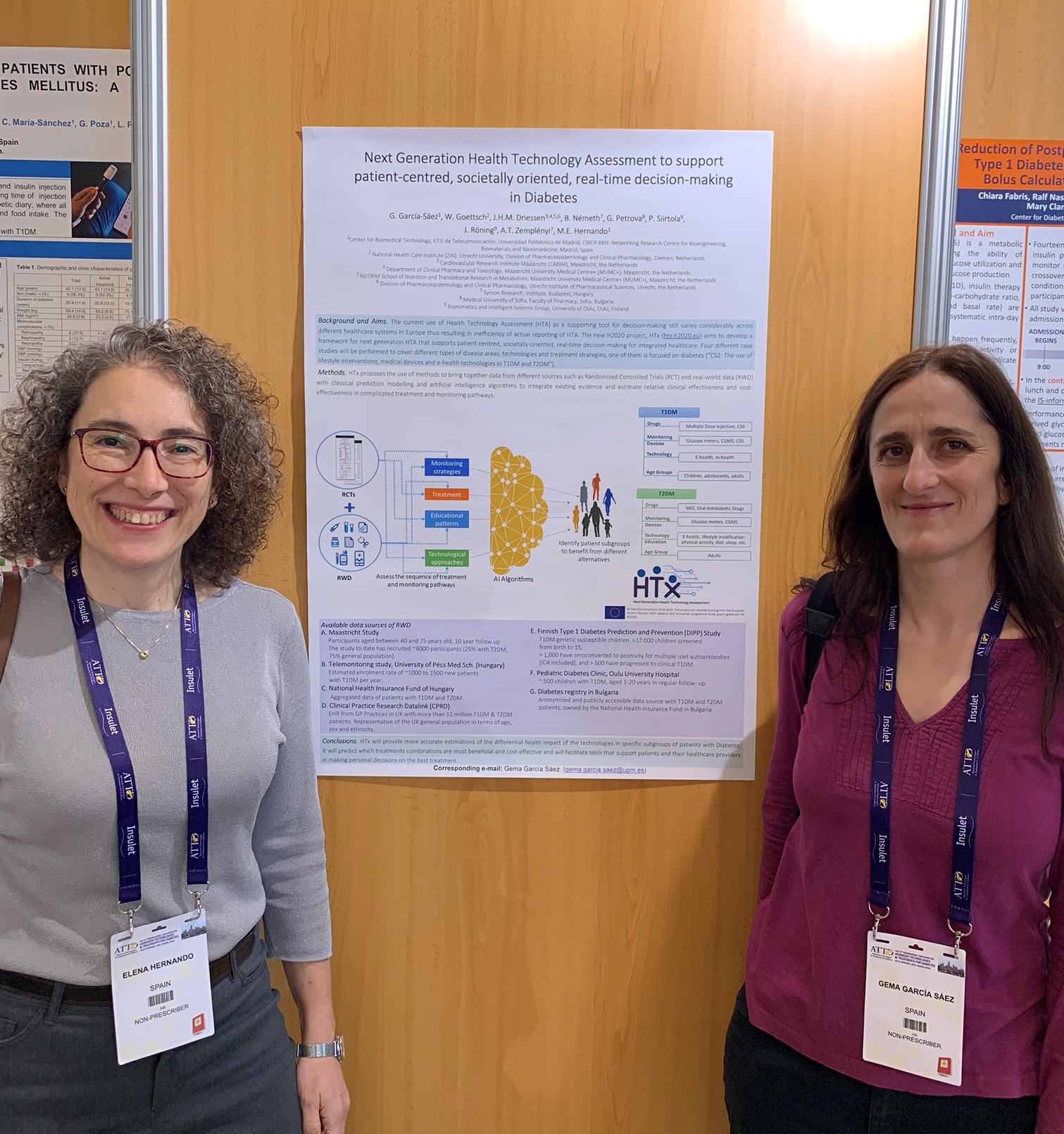
16 Mar HTx diabetes case study at the International Conference of Advanced Technologies & Treatments for Diabetes, Madrid, Feb 2020
The conceptual framework of the HTx case study on Diabetes was presented at the poster section of the International Conference of Advanced Technologies & Treatments for Diabetes in Madrid, held between 19-22 February 2020. The HTx consortium was represented by Gema García Sáez and Maria Elena Hernando from the Universidad Politécnica de Madrid.
Scroll down for the poster abstract or visit the Publications/Scientific publications section of the HTx website to download the poster.
NEXT GENERATION HEALTH TECHNOLOGY ASSESSMENT TO SUPPORT PATIENT-CENTRED, SOCIETALLY ORIENTED, REAL-TIME DECISION-MAKING IN DIABETES CLINICAL DECISION SUPPORT SYSTEMS/ ADVISORS
G. García Sáez (1), W. Goettsch, Phd (2), J.H.M. Driessen (3,4,5), B. Németh (6), G. Petrova (7), P. Siirtola (8), J. Röning (8), A.T. Zemplényi (6), M.E. Hernando (1)
1 Center for Biomedical Technology, ETSI de Telecomunicación, Universidad Politécnica de Madrid,
Ciber-bbn: Networking Research Centre For Bioengineering, Biomaterials And Nanomedicine, Madrid, Spain,
2 National Health Care Institute (ZIN); Utrecht University, Division Of Pharmacoepidemiology And Clinical Pharmacology, Diemen, Netherlands,
3 Cardiovascular Research Institute Maastricht, (carim), Maastricht, Netherlands, 4
Department of Clinical Pharmacy and Toxicology, NUTRIM School of Nutrition and Translational Research in Metabolism, Maastricht University Medical Centre+ (mumc+), Maastricht, Netherlands,
5 Division of Pharmacoepidemiology and Clinical Pharmacology, Utrecht Institute Of Pharmaceutical Sciences, Utrecht, Netherlands,
6 Syreon Research, Institute, Budapest, Hungary,
7 Medical University of Sofia, Faculty Of Pharmacy, Sofia, Bulgaria,
8 Biomimetics and Intelligent Systems Group, University Of Oulu, Oulu, Finland
Background and Aims: The current use of Health Technology Assessment (HTA) as a supporting tool for decision-making still varies considerably across different healthcare systems in Europe thus resulting in inefficiency of actual reporting of HTA. The new H2020 project, HTx (htx-h2020.eu) aims to develop a framework for next generation HTA that supports patient-centred, societally-oriented, real-time decision-making for integrated healthcare. Four different case studies will be performed to cover different types of disease areas, technologies and treatment strategies, one of them is focused on T1DM and T2DM.
Methods: HTx proposes the use of methods to bring together data from different sources such as Randomized Controlled Trials (RCT) and real-world data (RWD) with classical prediction modelling and artificial intelligence algorithms to integrate existing evidence and estimate relative clinical effectiveness and cost-effectiveness in complicated treatment and monitoring pathways.
Results: In T1DM and T2DM, the expected results are to assess the impact of using medical devices such as insulin infusion pumps, continuous glucose monitoring, and glucose meters, e-health technologies such as telemonitoring complemented by data visualization and decision support; and/or lifestyle interventions. We will link data from RCTs on these technologies to large population-based diabetes registries and health care claims data.
Conclusions: HTx should be able to provide more accurate estimations of the differential health impact of the technologies in specific subgroups of patients with Diabetes; predict which treatment combinations are most beneficial and cost-effective and facilitate tools that support patients and their healthcare providers in making personal decisions on the best treatment.
